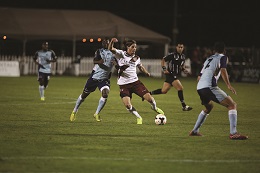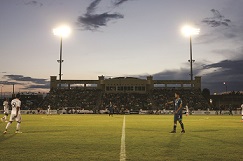
 Attracting a quality sporting event to your city requires a great deal of work. The process always begins with hours of research, strategy, and planning before any interest can be expressed or a bid submitted. But even if a city is lucky enough to have its bid accepted to be the host location of a premium event, it’s still only the beginning of a long process to ensure it is a success.
Attracting a quality sporting event to your city requires a great deal of work. The process always begins with hours of research, strategy, and planning before any interest can be expressed or a bid submitted. But even if a city is lucky enough to have its bid accepted to be the host location of a premium event, it’s still only the beginning of a long process to ensure it is a success.
Retaining or repeating sports events is also crucial, and to do so, the event must be a success for both the event director and the competitors who participate and support it. If it is possible to create a positive lasting experience for both, a city ensures the event will keep on coming back to the city year after year. After all, people do have choices about where they go and whether they come back to a particular event or a particular city.
Something we know as sports commission professionals is that a large part of keeping an event in town is being able to provide the star treatment for visitors. Athletes like to know they are special and event directors like to know their business is valuable. So what is the best way to go about providing both these experiences so that both sides benefit? And what are some concrete examples of what event directors and rights holders should ask for in order to create an event that makes people feel that way? Here are some ideas.
Star Treatment: A Trickle-Down Theory
Giving athletes the star treatment means starting at the top. Before their team ever comes to town, event organizers and rights-holders should know they are important and that their event is important. This is the first strategy that should be implemented by the sports commission, and event owners and rights-holders should know to look for it.
Rights-holders should already feel that many of the duties they face are being taken care of. Here are some of the first signs they are getting the star treatment:
-
The city has alleviated any unnecessary steps or repetition of set-up requirements
-
The rights-holder is getting assistance with promotions, permits, contracts, facilities, and all of the other headaches
-
Most importantly, the event organizer is able to focus on the most important elements for their success: the event and the experience of the athletes.
With the ability to focus on the athletes (and not so much on the business aspects that are the specialty of the sports commission or convention and visitors bureau), the event owner or rights-holder can spend more time on the details of the event that athletes will see.
Directly Impact the Athlete Experience
The event director or rights holder should be able to give athletes the star treatment by being able to provide answers to all questions – not just about the event but about the venue, the hotel, the city, transportation and everything else they might need to know while they’re in town. A primary job for any CVB or sports commission, therefore, is to be able to provide this information in the first place, by knowing the area itself, not just the people who can contribute to the competitive event, but also the ancillary events and activities that impact city operations year-round.
The athletes spend a great deal of time at the event, but they – and their families and friends – also spend a significant time outside of the competition and are always searching for the social aspects of the host city. Event organizers, sports planners and rights holders should be able to make the following materials available to the athletes: guide books, website links, pamphlets, maps and apps that provide important information about things to do in the community. This will help show all of the entertainment options available and showcase the fun that can be had outside of the competition venue. If sports commissions can provide these materials, plus discount coupons to attractions or restaurants, it makes it even easier to find things to do, and it goes a long way toward helping the athletes have a great time.
 Volunteer Assistance
Volunteer Assistance
Events cannot be run successfully without help. Event owners, sports planners and rights holders should be confident that the sports commission has made sure they have access to the right volunteers to help with all aspects of the event. Volunteers are the first point of contact for many participants and they can treat them like the stars they are. Volunteers who have worked continuously at local events are knowledgeable, helpful and an incredibly valuable resource. These are the people who interact with the athletes the most directly, and hopefully who will be leaving a lasting positive impression on them.
Being a V.I.P.
Something else that will make it fun and easy for athletes is having the city be aware of the presence of their event. The sports commission can also ease the way for the event owner or rights holder by using their relationships with service providers in the city. Although all relationships are different, rights-holders should know sports commissions can function in various capacities: hotel liaison, intermediary to create new corporate and civic relationships, parking and transportation experts, as well as to facilitate media and public relations services. Athletes feel important when a city is ready to handle their needs.
Starting at the Beginning – and Before
The rights-holder or event owner should start early to form the relationships that will ensure their athletes receive star treatment. Do research on the city – and ascertain the sports commission has also done research into the event as well. Both should have determined they are a good fit for one another. The sports commission will want to verify that rights fees and support money carries over to the athletes; this can mean it enhances the athlete experience by allowing for procurement of a nicer venue, attraction of more participants, or the purchase of nicer, higher-quality incentives and giveaways for participants. Many times, the investment also can be used to reduce the cost of participation for the athletes and help to increase the number of participants. These are all things the athletes will notice.
Why Retaining Events – and Keeping them Coming Back – is Important
Naturally, sports commissions want to recruit and retain recurring events. To do that, these commissions want to help organizers put on a first-class event that leaves athletes happy. But even if the event does not necessarily present itself as an annual event, or if it rotates its location year after year, the sports commission should be approaching your event – and others – as if they were up for renewal each season. Recurring events make the most sense from an economic standpoint, and logistically it becomes easier for everyone involved to plan and improve an event that has been in a city previously, so keeping event owners and athletes happy means they will want to come back at some point.
Furthermore, the growth potential for a returning event can be great when an event organizer and participating athletes know the market. Once athletes have a great experience at an event, they’ll market the location and the event by sharing a positive experience through social media, by word of mouth or with photos. When they experience a particular event in a location that catered to their needs both competitively and socially, they’ll encourage more competitors and patrons to join them the next time it occurs in that city. (It also may draw new sports events to the city – an ancillary benefit for the sports commission).
When athletes spread the word that they were treated well in a specific city and that the event was great, it draws even more athletes to that event the next time around – a big plus for the event owner or rights-holder. No matter which side of the business relationship you’re on, a positive reputation for an event is always vital.

